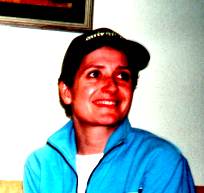
Layout & Idea of FolkWorld © The Mollis - Editors of FolkWorld
Alyth McCormack from the Isle of Lewis (Scotland) talked to Marcus Metz at the Scottish Folk Festival in Frankfurt (Germany) on the 12th of January 2000.
Marcus: Where did you grow up?
Alyth: I grew up in a village called Sandwick, which is just outside the main town of Stornoway on the island of Lewis. I had a
great childhood there, I have a lot of fond memories of it because we lived out in the country and I could walk to school over
the crofts and it's a very close community. For some reason I also remember the weather being better then it is nowadays. But I
grew up near my grandparents and my granny sang Gaelic songs. I stayed there and went to school and high school and didn't
leave the island till I was eighteen.

Marcus: How did you start singing?
Alyth: I started singing at local mods, which are sort of small Gaelic festivals. All the local
school kids would sing in choirs. I also started singing in Sunday school. I'm not a
strongly religious person myself but the island has got a strong Protestant religion and
Lewis is renowned more for its singers rather than its instrumentalists. I've always
wondered whether it's because a lot of people started singing in church.
Marcus: Where do you find your songs?
Alyth: I like to listen to a lot of old recordings of older people; I mean there's a lot of
archive recordings, and just from people that you meet. When people know that you are
a singer they'll sing you songs. You know, you often pick them up like that.
Marcus: Where are you going to the archives? Is this in Glasgow or in Edinburgh...?
Alyth: No! Well there are archives, there is school of Scottish studies in Edinburgh which is a great help and a lot of singers go
there. But also the BBC have recorded a lot of singers over the years and they're very good in letting you come along and listen
to these recordings.
Marcus: How do you see the situation of Gaelic in Scotland today?
Alyth: There are far more people speaking Gaelic and what has happened definitely over the years is.... When I was in school
I left school about ten years ago there wasn't the same interest in Gaelic and there wasn't the same number of young children
speaking Gaelic. Now they have schools set up purely in Gaelic to teach kids, that'll be their first language. I mean it was lost
for my generation and my parents' generation; it just wasn't the done thing. But it's picked up hugely and a lot of money has
been put into encouraging people to work so that there are jobs in Gaelic. It's great! I think the problem that happened initially
was when people were working on Gaelic programs they were people who had expertise in a technical side but not in Gaelic -
so they didn't have the language. Now through training in college and that you have people that got the expertise technically
and also they' got the language. So the understand the culture better. So the programs are improving and more people are being
encouraged. And with the new parliament and that there's an excitement in Scotland at the moment. So hopefully that will help
the language as well.
Latest published CD: The Selkie (Independent)
Photo Credit: Marcus Metz
Back to the content of FolkWorld Articles & live reviews
To the content of FolkWorld online magazine Nr. 14
All material published in FolkWorld is © The Author via FolkWorld. Storage for private use is allowed and welcome. Reviews and extracts of up to 200 words may be freely quoted and reproduced, if source and author are acknowledged. For any other reproduction please ask the Editors for permission.
